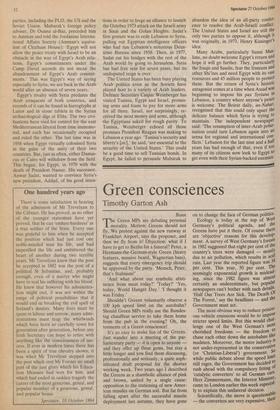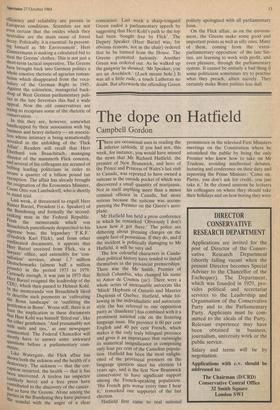Green consciences
Timothy Garton Ash
Bonn
The Green MPs are debating personal morality. Motion: Greens should not fly. We protest against the new runway at Frankfurt Airport, says the proposer, and then we fly from it! Objection: what if I have to get to Berlin for a funeral? Peter, a Hermann-the-German-style Green (heavy features, massive beard, Wagnerian bass), suggests that every emergency trip should be approved by the party. `Mensch, Peter, that's Stalinism!'
`And what about our symbolic absti- nence from meat today?"Today?"Yes, today, World Hunger Day.' I thought it was Friday.'
Shouldn't Greens voluntarily observe a 100 kph speed limit on the autobahn? Should Green MPs really use the Bundes- tag chauffeur service to take them home from the pub in the evening? Oh, the torments of a Green conscience!
It's so easy to make fun of the Greens. Just wander into a meeting of the par- liamentary party — it is open to anyone and they offer up these gems, but stay a little longer and you find them discussing, professionally and seriously, a quite soph- isticated draft proposal for the shorter working week. Two years ago I described the Greens as a shambolic alliance of pink and brown, united by a single cause: opposition to the stationing of new Amer- ican missiles on German soil. But far from falling apart after the successful missile deployment last autumn, they have gone on to change the face of German politics.
Ecology is today at the top of West Germany's political agenda, and the Greens have put it there. Of course there are 'objective' reasons for this develop- ment. A survey of West Germany's forests in 1982 suggested that eight per cent of the country's trees were damaged — mostly due to air pollution, which results in acid rain. Last year the reported figure was 34 per cent. This year, 50 per cent. The seemingly exponential growth is mislead- ing, since the 1982 figure was almost certainly an underestimate, but popular newspapers can't bother with such details. `Half Our Trees Are Sick. The Death Of The Forest,' say the headlines — and the Government must act.
The most obvious way to reduce poison- ous vehicle emissions would be to impose stricter speed limits. But this would chal- lenge one of the West German's most cherished freedoms — the freedom to chase each other down the autobahns like madmen. Moreover, the motor industrY is not under-represented in the conservative (or 'Christian-Liberal') government. SO while public debate about the speed limit still rages, the Government has decided to rush ahead with the compulsory fitting of `catalytic converters' to all German cars' Herr Zimmermann, the Interior Minister, came to London earlier this week especial- ly to explain this unilateral decision. , Scientifically, the move is questionable the converters are very expensive, their efficiency and reliability are proven in European conditions. Scientists are not even certain' that the oxides which they neutralise are the main cause of forest decay. Politically, it is essential. In present- ing himself as `Mr Environment', Herr Zimmermann is making a calculated bid to steal the Greens' clothes. This is not just a, short-term tactical imperative. The Greens have brought back into German politics a whole emotive rhetoric of agrarian roman- ticism which disappeared from the voca- bulary of the German Right in 1945. Against the colourless, managerial back- drop of West German parliamentary poli- tics in the late Seventies this had a wide appeal. Now the old conservatives are trying to recapture some of the rhetoric of conservation.
In this they are, however, somewhat handicapped by their association with big business and heavy industry — an associa- tion whose intimacy is being sensationally revealed in the unfolding of the 'Flick Affair'. Readers will recall that Herr Eberhard von Brauchitsch, managing director of the mammoth Flick concern, and several of his colleagues are accused of bribing leading politicians in order to secure a quarter of a billion pound tax exemption. The affair has already brought the resignation of the Economics Minister, Count Otto von Lambsdorff, who is shortly to stand trial.
Last week, it threatened to engulf Herr Rainer Barzel, President (i.e. Speaker) of the Bundestag and formally the second- ranking man in the Federal Republic. From the memoranda which von Brauchitsch punctiliously despatched to his supreme boss; the legandary 'F.K.F.' (Friedrick Karl Flick), and from other confiscated documents, it appears that Herr Barzel received from Flick, via a lawyers' office, and ostensibly for 'con- sultation' services, about 1.7 million Deutschemarks (almost half a million Pounds) in the period 1973 to 1979. Curiously enough, it was just in 1973 that Herr Barzel resigned the leadership of the which then passed to Helmut Kohl. In the memoranda von Brauchitsch liked to describe such payments as 'cultivating the Bonn landscape' or 'outfitting the gentlemen in Bonn'. Worse still, there is at least the implication in these documents that Herr Kohl was himself 'fitted out', like the other gentlemen. 'And presumably not with suits and ties,' as one newspaper c°mmented. The Federal Chancellor will shortly have to answer some awkward questions before a parliamentary corn- Mittee.
,Like Watergate, the Flick affair has shown both the sickness and the health of a democracy. The sickness — that the cor- ruption occurred, the health — that it has been uncovered. A tireless tax inspector (unlikely hero) and a free press have contributed to the discovery of the cancer. But so have the Greens. Alone among the parties, in the Bundestag they have pursued the scandal with the anger of a clear conscience. Last week a sharp-tongued Green ended a parliamentary speech by suggesting that Herr Kohl's path to the top had been 'bought free by Flick'. The Deputy Speaker (Herr Barzel was, for obvious reasons, not in the chair) ordered that he be banned from the House. The Greens protested furiously. Another Green was ordered out. As he walked up the gangway he shouted, 'Mr Speaker, you are an Arschloch.' (Loch means hole.) It was all a little rude, a touch Lutheran no doubt. But afterwards the offending Green
politely apologised with all parliamentary form.
On the Flick affair, as on the environ- ment, the Greens make some good and important points as well as silly ones. Many of them, coming from the 'extra- parliamentary opposition' of the late Six- ties, are learning to work with profit, and even pleasure, through the parliamentary system. It cannot be entirely a bad thing if some politicians sometimes try to practise what they preach, albeit naively. They certainly make Bonn politics less dull.



















































 Previous page
Previous page